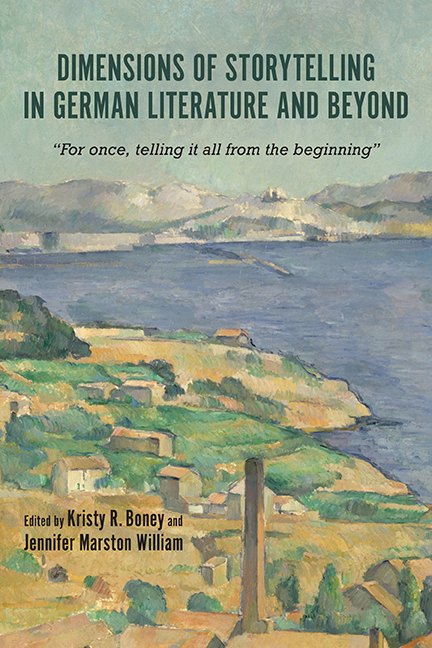 Dimensions of Storytelling in German Literature and Beyond
Dimensions of Storytelling in German Literature and Beyond Book contents
- Frontmatter
- Contents
- Acknowledgments
- Introduction: The Social, Political, and Personal Dimensions of Storytelling
- Part I Anna Seghers: A Missing Piece in the Canon of Modernist Storytellers
- Part II Expressions of Modernity: Using Storytelling Unconventionally
- Part III The Personal Narrative: Storytelling in Acute Historical Moments
- 14 Problems and Effects of Autobiographical Storytelling: Als Pimpf in Polen: Erweiterte Kinderlandverschickung 1940–1945 (1993) and A Hitler Youth in Poland: The Nazis’ Program for Evacuating Children during World War II (1998)
- 15 Too Near, Too Far: My GDR Story
- 16 Conflict without Resolution: Konrad Wolf and the Dilemma of Hatred
- 17 “Bleibt noch ein Lied zu singen”: Autobiographical and Cultural Memory in Christa Wolf's Novel Kindheitsmuster
- 18 Narrating germany's past: a story of exile and the return home—a translation of the chapter “above the lake” from ursula Krechel's Novel Landgericht
- 19 Storytelling in the GDR: An Interview with Eberhard Aurich and Christa Streiber-Aurich
- Notes on the Contributors
- Index
15 - Too Near, Too Far: My GDR Story
from Part III - The Personal Narrative: Storytelling in Acute Historical Moments
Published online by Cambridge University Press: 12 April 2019
- Frontmatter
- Contents
- Acknowledgments
- Introduction: The Social, Political, and Personal Dimensions of Storytelling
- Part I Anna Seghers: A Missing Piece in the Canon of Modernist Storytellers
- Part II Expressions of Modernity: Using Storytelling Unconventionally
- Part III The Personal Narrative: Storytelling in Acute Historical Moments
- 14 Problems and Effects of Autobiographical Storytelling: Als Pimpf in Polen: Erweiterte Kinderlandverschickung 1940–1945 (1993) and A Hitler Youth in Poland: The Nazis’ Program for Evacuating Children during World War II (1998)
- 15 Too Near, Too Far: My GDR Story
- 16 Conflict without Resolution: Konrad Wolf and the Dilemma of Hatred
- 17 “Bleibt noch ein Lied zu singen”: Autobiographical and Cultural Memory in Christa Wolf's Novel Kindheitsmuster
- 18 Narrating germany's past: a story of exile and the return home—a translation of the chapter “above the lake” from ursula Krechel's Novel Landgericht
- 19 Storytelling in the GDR: An Interview with Eberhard Aurich and Christa Streiber-Aurich
- Notes on the Contributors
- Index
Summary
I WANT TO TELL THE STORY of how I came to discover East Germany and to commit my professional life to the study of its culture. So this is an intellectual autobiography of sorts, not one that I claim to be representative but nonetheless one that might contribute to narrating the “story” of the German Democratic Republic (GDR), a state that has disappeared from the map, and one that also might reveal the challenges we face in making sense of postwar German history. It is not the first time I look back at the GDR; at the last count this seems to be the sixth time in the past twenty-five years that I am stepping back and assessing where we stand vis-à-vis what seems to be a closed book, whose tattered cover I keep reopening. This repeated, perhaps even obsessive approach to the past has less to do with history than it does with the present, that is, how we see things now, retrospectively, at any given point in time. Thus I want to engage here in that double process of memory work: remembering and forgetting. For me to (re)construct the schemes and patterns that describe the changes, in particular the before and after of November 9, 1989, as I see them now, I need to locate myself, at the same time being aware that in order to tell a compelling story, I tend to erase the contingent and discontinuous quality of the past. So with this awareness, let me begin by reflecting on the GDR, which is situated for me somewhere between proximity and distance: at one and the same time too near and too far.
The story begins in late November 1989, when I received an airmail postcard from my dissertation advisor, who out of the blue wrote to ask what I thought about the collapse of the Berlin Wall and whether I would be changing careers as a result.
- Type
- Chapter
- Information
- Dimensions of Storytelling in German Literature and Beyond“For once, telling it all from the beginning”, pp. 198 - 208Publisher: Boydell & BrewerPrint publication year: 2018
